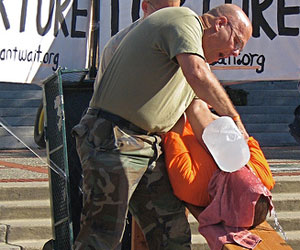Wednesday was a big day for torture-related news, so here’s what you need to know:
- Philip Zelikow, a former aide to Condoleezza Rice and the author of an anti-torture memo that he thinks Dick Cheney wanted destroyed, testified before a Senate Judiciary subcommittee. He outlined the campaign he and a few other Bush administration officials waged to change both the policy and the legal framework surrounding the treatment of terrorism suspects. They were, of course, unsuccessful.
- Sen. Sheldon Whitehouse’s (D-RI) subcommittee on Administration Oversight and the Courts, which held the hearing, released two unclassified 2005 memos that argued against the Bush administration’s detainee treatment policies. I outlined the highlights of the anti-torture memos on Wednesday afternoon.
- Ali Soufan, an FBI agent who participated in the interrogation of Abu Zubaydah, told Whitehouse’s subcommittee that “many of the claims made” made by President Bush and other top officials about that interrogation were lies. Soufan specifically contradicted claims that Zubaydah was not cooperating before waterboarding was authorized, that waterboarding led to the capture of dirty bomber Jose Padilla, and that waterboarding revealed the involvement of Khalid Shaikh Mohammed in the 9/11 attacks. He should know—he was there. Soufan’s prepared testimony is available here.
- In his prepared testimony, Zelikow revealed some previously unknown facts about the military’s interrogation program, known as “Copper Green,” which was run by the Joint Special Operations Command. Marc Ambinder highlighted the revelations and explained their relevance: “[T]he JSOC program was authorized in 2002, and there were numerous, early reports of abuses. Somehow, JSOC operators—the Delta Force boys, the Air Force SOAR teams, the Grey Fox collectors, Navy Seal folks—got their act together. Since JSOC’s operations are so highly classified, we don’t know who instituted these reforms. (Perhaps it was Stanley McChrystal, the JSOC commander-in-chief.)” McChrystal has just been appointed as the top general in Afghanistan, replacing the fired David McKiernan.
- The Obama administration abruptly changed course on its earlier decision to release more photos of detainee abuse by members of the military. The ACLU, which wanted the photos, will likely fight the decision in court. Andrew Sullivan, meanwhile, “can’t help but wonder if this is related to [Obama’s] decision to appoint Stanley McChrystal as the commander of his Afghanistan war and occupation. There is solid evidence that McChrystal played an active part in enabling torture in Iraq, and his activities in charge of many secret special operations almost certainly involved condoning acts that might be illustrated by these photos.” Esquire reported back in 2006 that McChrystal supervised the JSOC program in Iraq that was accused of horrifying abuses. One particularly damning passage: “It was a point of pride that the Red Cross would never be allowed in the door… ‘He had this directly from General McChrystal and the Pentagon that there’s no way that the Red Cross could get in — they won’t have access and they never will. This facility was completely closed off to anybody investigating, even Army investigators.'”
- In a long review of the subcommittee hearing, Marcy Wheeler notes that since Zelikow’s classified memo was distributed in 2006, “it should show up in Presidential Records.” If it doesn’t, that’s evidence of a violation of the Presidential Records Act. Of course, the Bush administration never much cared for the Presidential Records Act.
- Senator Lindsey Graham (R-SC) cited a widely-debunked December 2007 ABC News story as evidence that torture had worked. As the Washington Post‘s Greg Sargent explained, the debunked piece featured “CIA officer John Kiriakou’s unverified and second-hand claims that suspected terrorist Abu Zubaydah broke after being waterboarded [once] for under a minute.” That story was shown to be false in April when the Obama administration released four Bush-era Justice Department memos that indicated Zubaydah had been waterboarded “at least 83 times.”
- The Washington Independent‘s Daphne Eviatar highlighted Zelikow’s contention, in his prepared testimony, that he believed Bush lawyers’ interpretation of the law would allow for waterboarding of Americans.
- Steny Hoyer, the House majority leader, called for a torture investigation on Tuesday.














